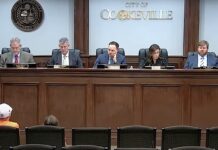
CUMBERLAND COUNTY – Tennessee Gov. Bill Haslam was in the Upper Cumberland region Monday morning to talk transportation and infrastructure needs, and officials discussed the cost of four major regional projects as part of his visit.
Haslam and Tennessee Department of Transportation (TDOT) Commissioner John Schroer were in Crossville as part of statewide tour on local transportation challenges. Haslam is set to visit 15 communities in all as part of the initiative.
The local projects ID’d on Monday, which would largely affect Fentress, Putnam and Cumberland counties, will cost $277.2 million combined. They include:
- Four widening projects that are in various stages of development on US-127 in Cumberland and Fentress counties between I-40 and State Route 62. These improvements total nearly 15 miles of roadway expansion. The estimated cost of completion is $135.1 million.
- In Cumberland County, two projects for new construction of the SR-462 Northwest Connector that are in development. Project 1 is from US-70N to US-127. Project 2 is from US-127N to Genesis Road (State Route 298). The estimated cost of completion is $18 million.
- Two US-127 widening projects in Fentress County. One is a 2.9-mile project from State Route 62 to the South Franklin Loop and the other is a 6.4-mile project from the South Franklin Loop to north of Grimsley. The estimated cost of completion is $96 million.
- And, in Putnam County, a widening project on South Jefferson Avenue (SR-136) from Highway 111 to Interstate 40 has a cost of completion of $28.1 million.
“Right now we have a multi-billion dollar backlog of highway projects across this state that address key access, safety and economic development issues and that’s only going to grow,” Haslam said in a release. “We know that we can’t depend on the federal government to be the funding partner that it once was. We also know that as our infrastructure ages, maintenance becomes more important and more expensive. And we know that maintaining our roads is only part of the equation.”
A 2015 Tennessee Comptroller’s report on transportation funding states that revenues are not expected to be sufficient to maintain current infrastructure.
Cars are more fuel-efficient, construction and labor costs have risen, and Congress hasn’t passed a long-term transportation funding bill in a decade. Tennessee’s population is expected to grow by 2 million by 2040, which puts a greater demand on the state’s infrastructure.
Funded primarily by state and federal gas taxes, TDOT gets no money from the General Fund. Funding uncertainty from the Federal Highway Trust Fund forced TDOT to delay $400 million in highway projects in 2015.
Participants in Monday’s talks included state legislators, mayors, local elected officials, business leaders, chamber of commerce executives and local infrastructure officials. The Crossville visit was the only one scheduled in the UC.
Crossville-Cumberland County Chamber of Commerce President/CEO Brad Allamong had asked business leaders to ID any roads and/or highways that are currently impacting their profitability and said the top needs would be shared with Haslam during the event.







